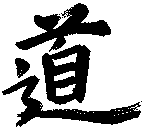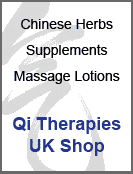 |
Taoism And The Taoist Arts |
|||
Herbalism |
||||
Background & History: The Taoist Arts: |
The
early Taoists combined their study of nature and their scientific approach to
the world in the study of herbalism - by painstaking experimentation on themselves
a huge body of lore was built up regarding the properties of different herbs.
Today, that In the West the active components of herbs and other plants are often synthesised for use as medicine but in Chinese medicine the herbs are used whole, either powdered and taken in capsules or, more often, infused in water and drunk as tea. Herbs in their natural form are often less harmful than synthesised versions as chemicals will be present which can aid the main action of the herb and help the body deal with its effects, thus boosting effectiveness and minimising side effects. Herbs are also used to supplement the diet to prevent disease and aid health, the most famous being Ginseng which is now widely available in the West. In China, many medicinal herbs are regularly used in cooking - for instance Huang Qi (astragalus), the root of the Milk Vetch plant, is added to chicken soup to make a powerful immune boosting recipe. Chinese herbal formulas are complex, and often consist of a dozen or more different ingredients in different amounts. A trained Chinese herbalist will make up a formula tailored to his patient's specific illness, and this is often modified as time goes on and the patient begins to recover. The Taoist approach is to make use of what is around us in the natural world, so modern Western Taoists often study the applications of herbalism with herbs that are more readily available to them. Thus, while Chinese herbs are used by trained Chinese practitioners, the body of Western herbalist lore is of great use to those without Chinese training. Traditionally, in the West as well as in Ancient China, many herbs were used regularly to strengthen and tone the bodily systems. A group of herbs known now as alteratives and previously as 'blood cleansers' are of particular interest. In addition to any specific actions the alterative herbs, such as nettle and cleavers, have a general beneficial effect on all the bodys systems, a rather vague and diffuse assertion can only be understood from a wholistic viewpoint in which all aspects of health are related. Alteratives typically have a diuretic and cleansing action and many work on cleansing the kidneys or liver. They often have high vitamin or mineral content, and tonify the body at a basic level, helping the whole body by working on the vital systems. As digestion, elimination and circulation are strengthened and toxins are disposed of the whole body begins to move to a state of health. A good book and a herb supplier are all that's needed for anyone to begin learning about herbalism. A number of dried herbs are readily available from specialist suppliers or health food shops and these can be of great benefit in the home, and of course many can be easily grown and have culinary uses. Anyone suffering from any health problem who has had little luck with conventional medicine should consider approaching a trained herbalist - the herbal approach can be particularly helpful for problems that are not easily solved by conventional doctors, such as IBS, acne, asthma, migraine or ezcma. "Tonic [herbs] truly are gifts of Nature to a suffering
humanity - whole plants that enliven whole human beings, gifts of the Mother
Earth to her children"
The
Complete Illustrated Holistic Herbal by David Hoffman. ISBN 1-85230-847-8
(Hardback) 1-85230-758-7 (Softback). An excellent guide to the use of Western
herbs for medicinal purposes. Individual actions of a large selection of herbs
is given and suggested recipes for common conditions. Lovely illustrations.
Recommended. Order this title or browse through other Taoist related books
at the Taoist Bookshop (click here for the UK store.) |
|||
|
|
||||


 knowledge is one of the main parts of
knowledge is one of the main parts of